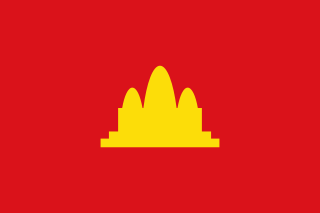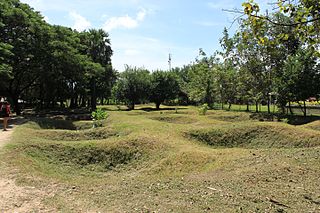| |||||
| Decades: | |||||
|---|---|---|---|---|---|
| See also: | Other events of 2014 List of years in Cambodia | ||||
The following lists events that happened during 2014 in Cambodia .
| |||||
| Decades: | |||||
|---|---|---|---|---|---|
| See also: | Other events of 2014 List of years in Cambodia | ||||
The following lists events that happened during 2014 in Cambodia .
| | This section needs expansion. You can help by adding to it. (December 2017) |
| | This section needs expansion. You can help by adding to it. (December 2017) |

Genocide is the intentional destruction of a people in whole or in part.

The Khmer Rouge is the name that was popularly given to members of the Communist Party of Kampuchea (CPK) and by extension to the regime through which the CPK ruled Cambodia between 1975 and 1979. The name was coined in the 1960s by then Chief of State Norodom Sihanouk to describe his country's heterogeneous, communist-led dissidents, with whom he allied after his 1970 overthrow.

Pol Pot was a Cambodian communist revolutionary, politician and a dictator who ruled Cambodia as Prime Minister of Democratic Kampuchea between 1976 and 1979. Ideologically a Maoist and a Khmer ethnonationalist, he was a leading member of Cambodia's communist movement, the Khmer Rouge from 1963 to 1997, and served as General Secretary of the Communist Party of Kampuchea from 1963 to 1981. His administration converted Cambodia into a one-party communist state and perpetrated the Cambodian genocide.

Ta Mok, also known as Nguon Kang, was a Cambodian military chief and soldier who was a senior figure in the Khmer Rouge and the leader of the national army of Democratic Kampuchea. He was also known as "Brother Number Five" or "the Butcher". He was captured along the Thailand-Cambodia border in March 1999 by Cambodian government forces while on the run with a small band of followers and was held in government custody until his death in 2006 while awaiting his war crime trial.

Kang Kek Iew, also spelled Kaing Guek Eav, aliasComrade Duch or Hang Pin, was a Cambodian convicted war criminal and leader in the Khmer Rouge movement, which ruled Democratic Kampuchea from 1975 to 1979. As the head of the government's internal security branch (Santebal), he oversaw the Tuol Sleng (S-21) prison camp where thousands were held for interrogation and torture, after which the vast majority of these prisoners were eventually executed.

Khieu Samphan is a Cambodian former communist politician and economist who was the chairman of the state presidium of Democratic Kampuchea (Cambodia) from 1976 until 1979. As such, he served as Cambodia's head of state and was one of the most powerful officials in the Khmer Rouge movement, although Pol Pot remained the General Secretary in the party.

Ieng Sary was the co-founder and senior member of the Khmer Rouge and one of the main architects of the Cambodian Genocide. He was a member of the Central Committee of the Communist Party of Kampuchea led by Pol Pot and served in the 1975–79 government of Democratic Kampuchea as foreign minister and deputy prime minister. He was known as "Brother Number Three", as he was third in command after Pol Pot and Nuon Chea. His wife, Ieng Thirith, served in the Khmer Rouge government as social affairs minister. Ieng Sary was arrested in 2007 and was charged with crimes against humanity but died of heart failure before the case against him could be brought to a verdict.

The Killing Fields are sites in Cambodia where collectively more than 1,300,000 people were killed and buried by the Communist Party of Kampuchea during Khmer Rouge rule from 1975-79, immediately after the end of the Cambodian Civil War (1970–75). The mass killings were part of the broad, state-sponsored Cambodian genocide. The Cambodian journalist Dith Pran coined the term "killing fields" after his escape from the regime.

Nuon Chea, also known as Long Bunruot or Rungloet Laodi, was a Cambodian communist politician and revolutionary who was the chief ideologist of the Khmer Rouge. He also briefly served as acting Prime Minister of Democratic Kampuchea. He was commonly known as "Brother Number Two", as he was second-in-command to Khmer Rouge leader Pol Pot, General Secretary of the Party, during the Cambodian genocide of 1975–1979. In 2014, Nuon Chea received a life sentence for crimes against humanity, alongside another top-tier Khmer Rouge leader, Khieu Samphan, and a further trial convicted him of genocide in 2018. These life sentences were merged into a single life sentence by the Trial Chamber on 16 November 2018. He died while serving his sentence in 2019.

Ieng Thirith was an influential intellectual and politician in the Khmer Rouge, although she was neither a member of the Khmer Rouge Standing Committee nor of the Central Committee. Ieng Thirith was the wife of Ieng Sary, who was Minister of Foreign Affairs of Democratic Kampuchea's Khmer Rouge regime. She served as Minister of Social Affairs from October 1975 until the fall of the Khmer Rouge in 1979.

Democratic Kampuchea was the Cambodian state from 1975 to 1979, under the totalitarian dictatorship of Pol Pot and the Communist Party of Kampuchea (CPK), commonly known as the Khmer Rouge. It was established following the Khmer Rouge's capture of the capital Phnom Penh, effectively ending the United States-backed Khmer Republic of Lon Nol. After Vietnam took Phnom Penh in 1979, it was disestablished in 1982 with the creation of the CGDK in its place.

The Extraordinary Chambers in the Courts of Cambodia, commonly known as the Cambodia Tribunal or Khmer Rouge Tribunal (សាលាក្ដីខ្មែរក្រហម), was a court established to try the senior leaders and the most responsible members of the Khmer Rouge for alleged violations of international law and serious crimes perpetrated during the Cambodian genocide. Although it was a national court, it was established as part of an agreement between the Royal Government of Cambodia and the United Nations, and its members included both local and foreign judges. It was considered a hybrid court, as the ECCC was created by the government in conjunction with the UN, but remained independent of them, with trials being held in Cambodia using Cambodian and international staff. The Cambodian court invited international participation in order to apply international standards.
Robert Petit is a Canadian lawyer who during 2006 and 2009 was the International Co-Prosecutor for the Extraordinary Chambers in the Courts of Cambodia, which is aiming to try Khmer Rouge leaders for violations of international criminal law in Cambodia between 1975 and 1979. He led the investigation and prosecution of five senior most leaders of the Khmer Rouge namely Nuon Chea, Ieng Sary, Ieng Thirith, Khieu Samphan, and Kang Kek Iew. The last was recently convicted for war crimes and crimes against humanity. Petit also initiated the prosecution of five other Khmer Rouge leaders whose cases are still under investigation by the United Nations-backed tribunal.

Crimes against humanity under communist regimes occurred during the 20th century, and they included forced deportations, massacres, torture, forced disappearances, extrajudicial killings, political terrorization campaigns, ethnic cleansing, and enslavement, as well as the deliberate starvation of people. Additional events included the commition of genocide, conspiracy to commit genocide, and complicity in genocide. Such events have been described as crimes against humanity.
Stuart Robert Glass was a Canadian adventurer and yachtsman killed by the Khmer Rouge in August 1978 while sailing a little yacht named Foxy Lady through Cambodian waters. One of nine "Western" yachtsmen known to have been seized by the Democratic Kampuchean regime between April and November 1978, he was the sole Canadian victim of the 1975–79 Cambodian genocide.

Red Wedding is a 2012 documentary film co-directed by Lida Chan and Guillaume Suon, which portrays a victim of forced marriage under the Khmer Rouge regime.
Group of Marxist–Leninists/Red Dawn is a Maoist group in the Netherlands. GML/Rode Morgen was founded in 1977, as a merger of a group of Amsterdam students and some groups of individuals expelled from the Communist Unity Movement of the Netherlands (Marxist-Leninist) in 1976. At the time of its foundation it had around 25 members. From the start, GML was mainly active in factories and trade unions.

The Cambodian genocide was the systematic persecution and killing of Cambodian citizens by the Khmer Rouge under the leadership of Prime Minister of Democratic Kampuchea, Pol Pot. It resulted in the deaths of 1.5 to 2 million people from 1975 to 1979, nearly 25% of Cambodia's population in 1975.
The following lists events that happened during 2015 in Cambodia.

Genocide is the deliberate and systematic destruction, in whole or in part, of an ethnic, racial, religious, or national group. The term was coined in 1944 by Raphael Lemkin. It is defined in Article 2 of the Convention on the Prevention and Punishment of the Crime of Genocide (CPPCG) of 1948 as "any of the following acts committed with intent to destroy, in whole or in part, a national, ethnical, racial, or religious group, as such: killing members of the group; causing serious bodily or mental harm to members of the group; deliberately inflicting on the group's conditions of life, calculated to bring about its physical destruction in whole or in part; imposing measures intended to prevent births within the group; [and] forcibly transferring children of the group to another group."
| | This section needs expansion. You can help by adding to it. (December 2017) |